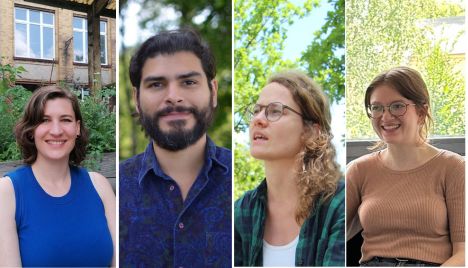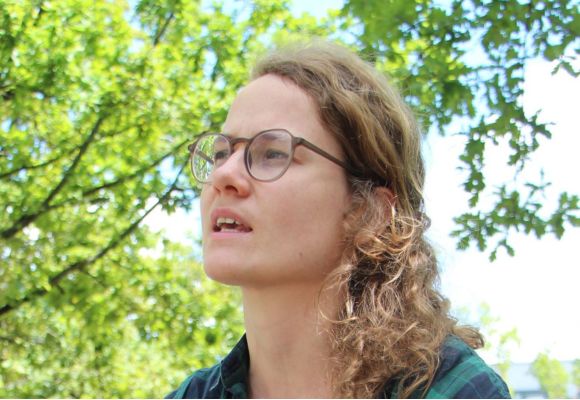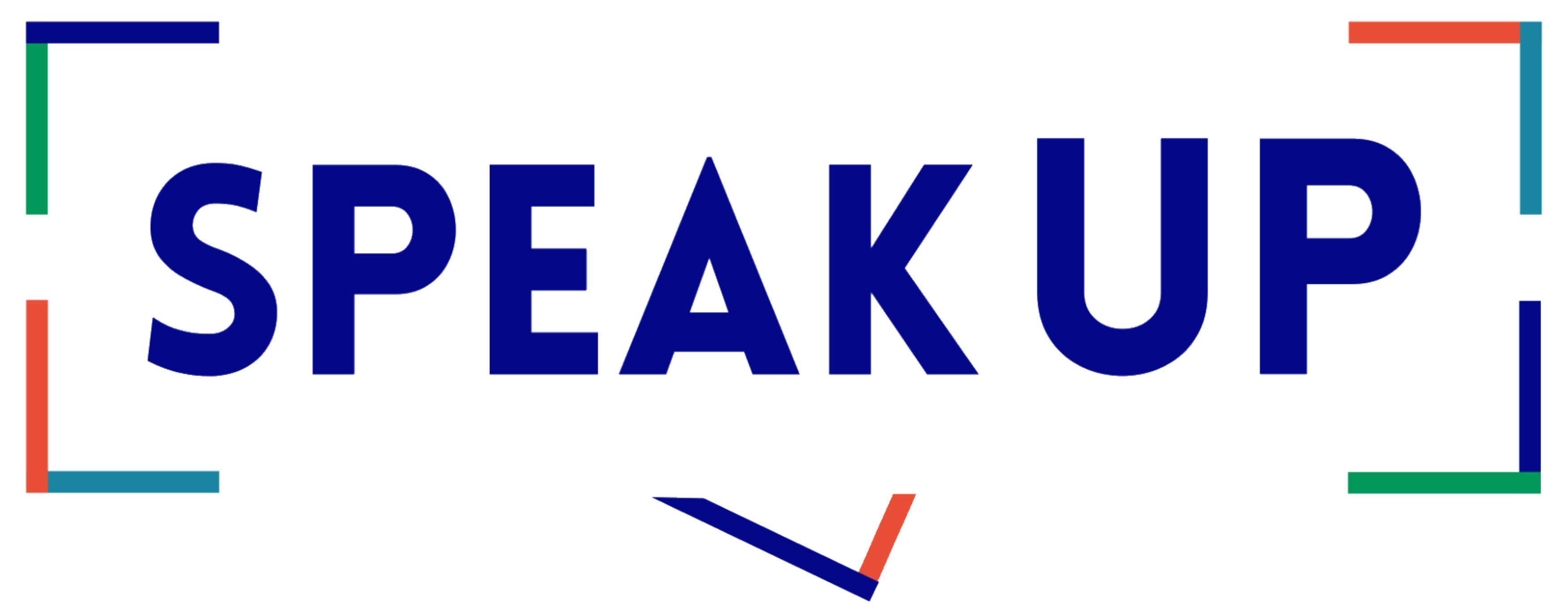How do Potsdam’s researchers deal with the planetary crisis?

We witness the impacts of the climate crisis everyday but we hardly get to meet the scientists who dedicate their life to understanding, describing and predicting them. Assessing the impacts of green extractivism, downscaling climate and ecological models to ever-more precise scales, understanding the monsoon system dynamics of the tropics and supporting Indigenous rights and self-determination in the Arctic are the missions of the researchers we talked to here in Potsdam. These are their stories. By Andrés Ángel, Maria Goldrina, Mona Horn, Eva Lüdke and Carolina Naumann.
ALEXANDRA TOST – Research Institute for Sustainability
The economy cannot continue to grow indefinitely.
Alexandra combines environmental studies and politics to foster change. When Alexandra was in school, her enthusiasm for politics and political education was sparked through a group from the Federal Agency for Civic Education. This eventually led her to study political science and economics at the University of Potsdam. Although she did not learn about climate change in school, she vividly remembers Al Gore’s documentary An Inconvenient Truth as a breaking point, like many. After completing her Master’s Degree in International Development Studies, Alexandra pursued her passion for social issues and human rights. She spent a year in Colombia, studying and working with local NGOs. Alexandra then worked with the German Agency for International Cooperation (GIZ) in Peru. There, she realized how social and environmental topics are increasingly linked. While living in Lima, she experienced a two-week water supply disruption due to floods. “That was a very existential experience”, she recalls.
Nowadays, Alexandra works in the field of democracy and sustainability at Potsdam’s Research Institute for Sustainability (RIFS). She just started her doctoral dissertation on green extractivism, green hydrogen and the positions of the progressive governments in Chile and

Colombia. Low-emission technologies and their social and ecological impacts are at the center of her interests. Who benefits and who decides where and when to exploit? Are Global South communities‘ views truly included in the decision-making? Is it correct to assume that decarbonization equals sustainability? These are some of the questions with which she deals on a daily basis.
A sense of purpose drives her to continue researching everyday and the increasing social awareness of the problem gives her hope. She emphasizes that “the economy cannot continue to grow indefinitely, which is also becoming increasingly accepted in the scientific realm” and adds that without concrete and timely actions, we will face even more drastic changes in the coming decades. “A transformation in all sectors and levels is needed”, she says. However, she is not pessimistic about the future and states that the urgency makes it difficult to separate science from activism. Alexandra even goes further and tells us that “this combination does not undermine scientific credibility at all”.
DÁNNELL QUESADA CHACÓN – Potsdam Institute for Climate Impact Research
The anthropocentric rationale and approach is to blame for this crisis.
When Dánnell studied civil engineering and specialized in hydrology in his native country Costa Rica, he could have never imagined ending up working hand in hand with the best climate scientists at PIK. Dánnell didn’t have a head start back then, but his talent, discipline and vision got him a Hydroscience and Engineering scholarship at the TU Dresden. He began questioning his professional practice as he observed the knowledge gap between modern climate models and practices in the global south, especially in biodiversity hotspots such as Costa Rica.
Like many people, he is affected by the current planetary crisis. Disappointment and concerns about the future are sometimes present: “Looking at the evidence, realizing what it means and the inability of our society to take structural actions is not easy” he says, and adds “the anthropocentric rationale and approach is to blame”. His typical day at work is spent discussing modeling pitfalls, entertaining new ideas, planning collaboration opportunities and processing large amounts of climate data. He now works downscaling climate models for the Inter-Sectoral Impact Model Intercomparison Project (ISIMIP) to help close the gap between detailed global models and local impact models.
Coming from a country barely larger than Lower Saxony that hosts over 5% of the world’s biodiversity, he knew he had to act. And so, he combined his interest in ecology with research on downscaling techniques, Bias-Correction and Deep Learning.
Dánnell also tries to assess the trade-offs of modeling our planet with different temporal and spatial resolutions. For his PhD he worked with climate projections of rainfall, temperature, radiation, wind speed, humidity and the distribution of some species in Saxony in different scenarios. He uses those to project the suitability of species and to draw conclusions on land conservation appropriateness.
For now, he will keep rushing every morning from Berlin to Potsdam and walking up the Telegrafenberg with a big cup of coffee in his hand to improve our understanding of Earth’s climate and ecosystems and to, hopefully, spark positive changes in decision-making.
ANJA KATZENBERGER – Potsdam Institute for Climate Impact Research
Bringing science to the people is really important to me.
Although the trend in scientific circles is increasingly towards inter- and transdisciplinarity, Anja stands out with her unusual academic career. After a bachelor’s degree in Mathematics and a master’s degree in the field of Environmental Systems, she now finds herself working in Climate Physics.
She first dealt with climate change during an extracurricular afternoon geography lesson on the topic. Back then, climate change was only briefly mentioned, but this has changed a lot over the past few years, she says. Anja’s curiosity led her to research and to contributing to the public discussion on climate change. This resulted in a master thesis at the Potsdam Institute for Climate Impact Research (PIK) and a subsequent ongoing PhD.
Currently, she researches monsoon system dynamics in India and West Africa in various greenhouse gas emission scenarios.
In order to understand the underlying atmospheric dynamics, she is working with idealized simulations of the Earth System, including a planet fully covered by water or a planet with a rectangular continent. Given the diverse elements such as the shape of continents, location of mountains and land cover, that play together in a complex manner, these idealizations provide the opportunity to study their individual roles in the monsoon circulation.
However, Anja is not coding and simulating planets 24/7. She also attends conferences and engages with the general public. She holds numerous talks to make science more accessible, especially at schools. “Bringing science to the people is really important to me”, she tells us. In her efforts, she also communicates with other researchers. Recently, Anja headed to India and Singapore to discuss her work with several researchers and held a presentation at the AOGS, a prominent geosciences conference.

When asked about the future of our climate, Anja warns us about more frequent and intense weather events. Such unpredictable monsoons should alarm policymakers, she states. In order to stabilize Earth’s climate, net carbon neutrality is indispensable.
In her view, various sectors can contribute: political movements, activists, businesses and ultimately science. Important is that these aim towards the same objective and complement each other while maintaining clear boundaries, as blurring the lines could undermine credibility. To her, engaging in scientific work and making one’s own conscious choices toward a sustainable personal lifestyle are central. However, they need to be complemented by structural changes.
EVIE MORIN – Research Institute for Sustainability
I believe in a strong connection between science and activism.
Evie Morin is from Comox, Canada, the traditional territory of the K’ómoks First Nation. Growing up, she could directly observe the impacts of climate change. Evie remembers the presence of the shrinking Comox Glacier she lived near and heard many stories about how much bigger it was in the past.
Her academic journey stands as a testament to the power of adaptability and a commitment to making a difference. It began with Architecture, switching to Natural Science and Human Geography and finishing with a master in Resource and Environmental Management. Her unique path eventually led her to help communities and municipalities in land use decision-making. She started working as a Planning Associate at EcoPlan International in Vancouver, where she still supports Indigenous self-governance and facilitates dialogues between Indigenous and non-Indigenous authorities. She also helps communicate about risks associated with climate change to diverse audiences with a range of experiences and backgrounds, aiming to provide tools for individuals to make informed decisions in their regions. Despite facing resistance at times, she remains committed to bridging the gap between different knowledge systems and ways of communication to foster resilience.
In addition, Evie is a researcher at RIFS Potsdam, where she focuses on improving research relationships between Indigenous and non-Indigenous researchers. Evie notes how research often results in misrepresentation and exclusion of Indigenous Peoples. “I hope that this field will become more open and integrated… the ideal future for me would be that the people who live in the Arctic are effectively involved in the design phase of the projects, right from the start”, she tells us.

One of Evie‘s primary projects is DÁVGI: Co-Creation for Biocultural Diversity in the Arctic, which aims to support collaboration and knowledge exchange between Indigenous rights holders, environmental organizations, local stakeholders, researchers and policymakers. The project aims to strengthen the conservation and restoration of biocultural diversity in the Arctic by engaging all actors. Learning from different knowledge systems is beneficial for Indigenous and non-Indigenous research institutions by leading to more meaningful, relevant, efficient and effective research, ultimately providing more inclusive and comprehensive information for decision-makers, while empowering Indigenous groups within the research process.
In her role as a RIFS researcher, Evie is presented with dynamic challenges. Her role involves extensive literature review, crafting policy briefs on Indigenous research funding, organizing conferences and workshops on Arctic research ethics and methods and navigating complex administrative processes within a diverse international team. Balancing these aspects requires building networks worldwide and this in turn means occasional travels to strengthen those relationships as well as many other exciting activities. In her opinion, science is a powerful tool to investigate questions and support ideas with strong evidence, but it is important to be aware of power dynamics: who is developing the questions, interpreting the data and controlling its use? Valuing diverse knowledge systems equally and challenging colonial structures in research can be a form of activism. For example, her work aims to advance climate research by listening to diverse knowledge systems, supporting Indigenous self-determination and promoting ethical Arctic research, ultimately creating a more comprehensive understanding of a complex challenge without causing harm. Through her work, she aspires to catalyze significant just climate research advances, thus contributing to fighting the climate crisis.
Evie Morin’s journey exemplifies the importance of adaptability, resilience and a commitment to making positive impacts. Her work at the intersection of science, Indigenous rights and environmental conservation brings hope for a more inclusive and sustainable future in the Arctic and beyond.
These were just four examples of people doing science for the people and for the planet. There are thousands around the world striving every day to shed light onto our future. Alexandra, Dánnell, Anja and Evie belong to a new generation of scientists who, without losing any rigor, are able –and willing to– push for a better planet. Immersing in this anthropic crisis, the perspective may seem grim and dismal. But as long as people like them exist, we can always have hope.



